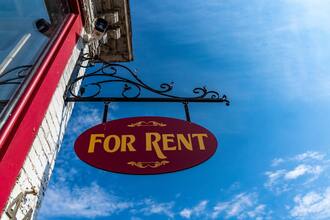|
Whether you're a first-time renter or a seasoned pro, you may want to ask prospective landlords some key questions before you sign a lease to rent an apartment or house. Here are some questions to ask before signing a lease. 1. How long is the lease term?
A lease is usually 12 months, according to Consumer.gov. But some landlords and management companies may offer lease terms from 6 months up to 18 months, says Time. You may want to ask your prospective landlord whether the rental agreement's lease term is flexible. If you can sign a longer-term lease, a management company may be able to offer a monthly discount on the rent, states Time. 2. What's included in the rent? Make sure to ask the landlord and management company what utilities are included in your rent, says Trulia. Get specific and ask exactly which utilities you're responsible for and what the landlord will cover. You may also want to consider asking about amenities like parking, lawn care, storage and pool access, says Trulia. Depending on the rental, you may have additional fees for these types of services and amenities. 3. When is rent due and how do I pay it? Each landlord and management company is different, so make sure to confirm their specific rental payment process. Ask when and how you can submit rent and if there are any late fees if you miss a payment, says Apartment Guide. Also, if you're looking to move in the middle of the month, consider asking the management company if they'll prorate the rent so you only pay the amount of rent for the time you're actually living in the unit, says Trulia. For example, if your rent is $1,200, but you move in the middle of the month, the prorated rent for that month may be closer to $600. 4. Is the security deposit refundable? Generally, security deposits are refundable if you do not break the terms of your lease and there is no damage to the unit. If you do break your lease or leave damage in your rental, your landlord may keep all or part of your security deposit to help cover those expenses, says Consumer.gov. 5. Is renters insurance required? Landlords and management companies may require tenants to have renters insurance. A renters insurance policy helps cover your belongings if they're stolen or damaged by a covered peril, such as a fire. Renters insurance can also provide liability coverage that helps protect you financially if you're found legally responsible for someone else's injuries or damage to their property. Consider speaking with your insurance company to find out what coverages fit your situation. 6. How much notice do I give before vacating? Typically, the lease agreement specifies how much notice you need to give a landlord or management company before moving out of the property. It can vary from one to three months, so make sure to confirm this information before signing the lease, says Trulia. 7. What's the penalty for breaking my lease? The penalty for breaking a lease can vary depending on state laws and the individual landlord or property manager. Some penalties may include forfeiting your security deposit, paying several months of rent or paying a percentage of the amount of rent left in your lease term, says Trulia. It's a good idea to read over your lease to understand what happens in case you need to move sooner than you anticipated. 8. Is there emergency maintenance? Before signing a lease, ask what sort of emergency maintenance the landlord offers, says Apartment Guide. Find out how you can access the 24/7 maintenance crew in case something happens. Also, make sure you know the procedure for submitting general maintenance requests for your unit. Get confirmation on how long it normally takes for those requests to get resolved. 9. How much notice will they give before entering my rental space? Check your lease to see if your management company or landlord lists a specific notice time for entering your rental for maintenance requests. Generally, landlords give tenants at least 24 hours' notice before entering your rental unit, says The Balance. 10. Is there any known construction planned for the building (or nearby)? Depending on the rental and its location, you may want to ask if any construction is planned for the apartment complex or nearby area, says Trulia. This can help you decide if you want to live in an area with pending construction. 11. Are pets allowed? Landlords and management companies can vary in their pet policies, says Apartment Guide. You might be looking at a rental that only allows cats, or maybe they only allow small dogs. No matter what the pet policy is, be sure to ask if there are any nonrefundable deposits or pet rent you may have to pay during your lease term. 12. What's the guest policy? Similar to the pet policy, landlords have varying rules for overnight guests, visitors or even extended stays, says Apartment Guide. Be sure to read over your lease terms to know the specific guidelines you need to follow. Asking your prospective landlord or management company these questions can help make your renting experience a little easier.
1 Comment
Chris Baskin writes to help others live more simply explaining ways for renters to stay cool and save money this summer. In an article from October 2022, when he wrote for Treehugger.com, he wrote about ways to stay cool and save money during the summer.
Follow the link below to learn more. 13 Great Tips for New Homeowners and First-Time Home Buyers You can survive becoming a new homeowner. Here are 13 great tips for new homeowners and first-time home buyers.
If so, maybe it's time to take control of your finances and create a budget!  5024720 © Dennis Crumrin | Dreamstime.com 5024720 © Dennis Crumrin | Dreamstime.com A budget is simply a plan that helps you manage your money by tracking how much income comes in and how much goes out. It can be broken down into three simple steps: setting goals, tracking expenses, and adjusting as needed. The first step to creating a budget is setting financial goals for yourself. Ask yourself what do I want my money to accomplish? Do I want to save up for something specific or pay off debt? Once you have determined what those goals are, it will give direction when making decisions about spending habits or saving strategies. The second step involves tracking expenses - both necessary ones like rent/mortgage payments as well as discretionary items such as entertainment costs - over an extended period of time (at least one month). This will help identify areas where changes need to be made in order for the desired outcomes from Step 1 above can be achieved more easily. Lastly, adjust accordingly based on the results obtained from Steps 1 & 2 above; if necessary make cuts here or there in order increase savings rates while still staying within overall goal guidelines set earlier on during this process (i.e., paying off debts faster than originally planned). Also remember that budgets should not feel restrictive but rather liberating because they provide structure which leads towards greater success with achieving long-term financial objectives! Creating a budget may seem overwhelming at first but once everything gets going it really isn’t too difficult – just remember these 3 steps: set goals; track expenses; adjust accordingly – and before long managing finances won't even require any thought because everything becomes second nature. Try Ramsey Solutions' free EveryDollar app to help you get started.
 28593722 © Pingvin121674 | Dreamstime.com 28593722 © Pingvin121674 | Dreamstime.com It's no secret that rent increases can be a real burden on your finances, especially if you're living on a tight budget. But don't worry - there are ways to survive and even thrive during these tough times. Here are some tips for surviving a rent increase:
 The Fair Housing Council of Oregon (FHCO) is a statewide civil rights organization whose mission is to eliminate illegal housing discrimination and ensure equal access to housing choice through education and enforcement of fair housing law. Fair housing involves the rights that all people have to choose housing free from unlawful discrimination practices based on “protected class status.” Federal, state, and local fair housing laws all play a part in protecting people seeking housing from illegal discrimination in any housing transaction, including rentals, sales, lending, and insurance. Fair housing ensures access for everyone. Fair housing guarantees that regardless of your race, sex, national origin, religion, family situation, or level of ability, you have the right to find housing that fits your needs — with no outside biases or stereotypes imposed upon you. By promoting fair housing through education and enforcement, the Fair Housing Council of Oregon creates welcoming, inclusive, and diverse communities that reflect all Oregonians. Click below to learn more about FHCO or to report discrimination.  Even if you are receiving assistance with your rent, as a new renter, there are several important things you should know. First and foremost, make sure to read your rental agreement thoroughly and understand the terms before signing anything. This will help ensure that you’re aware of all the rules and regulations that come with renting an apartment or house. Second, it’s important to budget for any additional costs associated with being a tenant such as utility bills or renters insurance premiums. Make sure to factor these into your monthly expenses so you can be prepared financially when they arise throughout the year. Additionally, if something goes wrong in your unit like broken appliances or plumbing issues, contact your landlord right away so they can take care of it quickly! Finally, get familiar with local laws regarding tenants' rights in case any disputes arise between yourself and other tenants/landlords during tenancy period; this way you have legal recourse if needed down the line which could save time & money in long run! It's also helpful for landlords too because having informed renters who know their rights helps keep everyone on same page about expectations from each party involved- making whole process smoother & easier overall! If you or someone you know is experiencing a mental or behavioral health crisis, free help is immediately available.
The 988 Suicide and Crisis Lifeline is available 24 hours per day, 7 days per week, via phone, text and online chat, offering people compassionate care and support from trained crisis counselors for individuals, families or their loved ones. One does not have to be suicidal to call 988 but can reach out when experiencing any behavioral health crisis. 988 call services are available in English and Spanish, along with interpretation services in more than 150 languages. Texting 988 and online chat are currently available only in English. Veterans and military service members can call 988 and press “1” to connect with the Veterans Crisis Line. Prevent foodborne illness during emergencies and disasters.
Check out these Resource Materials from USDA's Food and Nutrition Service. Security deposits are meant to protect the landlord, yet too often, tenants get screwed.
- By Lindsey Ellefson, LifeHacker
|
Housed
Whether you are a home owner or renting a place we strive to make this a place you can visit to find ways to stay safe, healthy, and happy while Housed. Categories
All
|




 RSS Feed
RSS Feed
